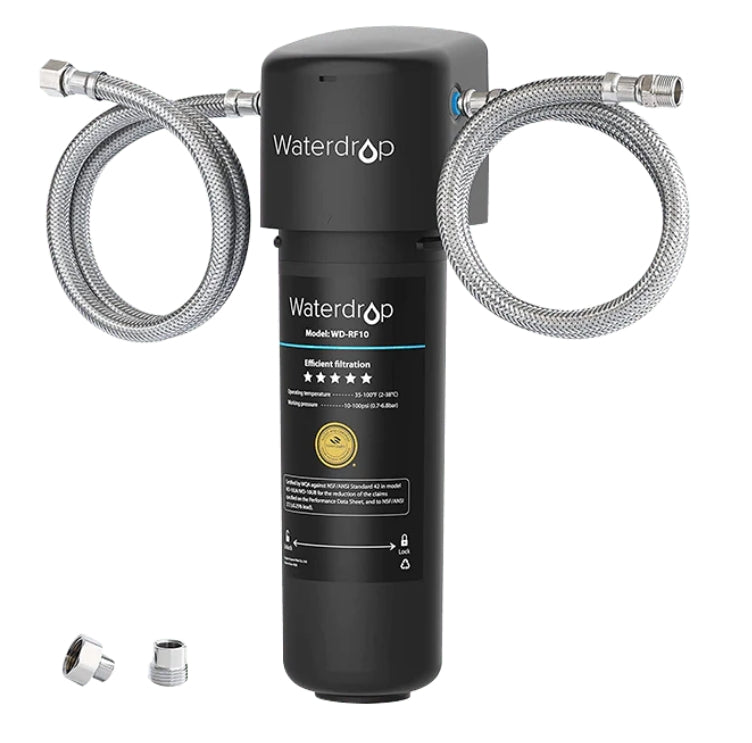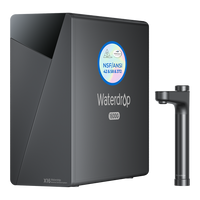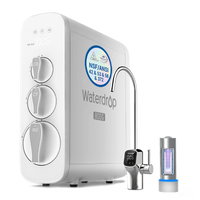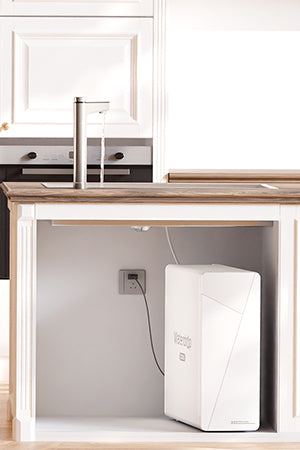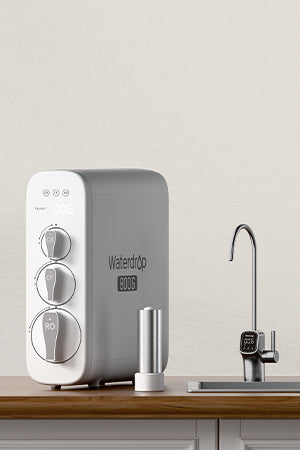Implementing a water filtration system inside one’s residence provides an additional safeguard against various toxins and chemicals. Fortunately, various water filters may be accommodated within residential settings, contingent upon individual preferences and financial considerations.
However, picking a water filter extends beyond considerations of fitting and cost since it entails choosing a filter that effectively addresses a particular issue with the water. Therefore, owning a water solution suitable for your residence is advisable and effectively resolves your water issue.
Although this choice may seem challenging, it becomes more manageable when you comprehend the many accessible options. This paper provides a complete analysis of various water filter types, their operational mechanisms, and an evaluation of their cost-effectiveness and implementation procedures.
Water Filters: What Are They?
The removal of impurities from water, such as bacteria, sediments, odor, heavy metals, and chemicals, may be accomplished by using water filters, which are purification devices. As a result of their enhancement of the water’s physical qualities, it becomes more suitable for consumption, cooking, cleaning, and bathing. Filters operate by several methods, including biological, chemical, or physical processes/barriers.
Certain filters have superior efficacy since they selectively target certain pollutants and effectively reduce silt levels. Every filter and its effectiveness are specifically engineered to address different levels of water-related issues that people may face. Nevertheless, the more the intricacy of a water filtration system, the higher the cost and upkeep that may be incurred before and after its implementation.
The Various Water Filter Types
Here is a list of several suggested water filters for household use. These filters are designed to eliminate impurities and poisons from your water efficiently.
- Undersink water filtration systems
- Water filters on a countertop
- Wholehouse water filters
- Systems for reverse osmosis
- Ultraviolet water purifiers
- Gravity water filters
Next, I will provide a comprehensive analysis of each kind.
Under-sink Water Filters
Under-sink water filters are very convenient since they are easily transportable and need minimum space. They are cost-effective and often called “on-demand” water filters. This is due to their direct connection to the water line, which may be accessed via the refrigerator or faucet.
The connection of a filter to a faucet or refrigerator enables the use of numerous systems within a household. Under-sink water filters play a crucial role in efficiently eliminating impurities, with the extent of their purification being contingent upon the specific kind of filter used. Various water filtration systems are available for under-sink water filtering, including reverse osmosis, carbon water filtration, and ultrafiltration.
Under-sink water filters operate via two distinct mechanisms: the primary and traditional types. The basic system involves the use of a single faucet for the distribution of feed water. In contrast, the conventional system employs distinct faucets to treat and distribute feed water. The filtration achieved by the traditional system is often superior since it purifies a smaller volume of water and has a longer duration than the simple system.
Are Under-sink Water Filters Worth It?
There are various benefits associated with under-sink water filters compared to other purifying methods. The factors above include their limited storage capacity, enhancement of water quality, straightforward implementation, cost-effectiveness, environmental sustainability, and diverse types. Moreover, these components may be readily replaced in the event of system malfunctions.
Chlorine, heavy metals, and chloramine are among the pollutants that these filters aim to remove. Therefore, the water being purified must not include impurities beyond these limits. It is essential to acknowledge that these systems possess a maximum operational duration of two years.
It is essential to mention that our Waterdrop systems are specifically intended for simple, do-it-yourself (DIY) installation, which a professional generally does. Our technique is characterized by its simplicity and convenience, saving time and cost. Additionally, it offers the advantage of self-installation, enabling users to swiftly establish their system without relying on expert support.
Countertop Water Filters
Countertop water filters are portable and very effective devices designed for water filtration. The system routes water from the faucet in your sink to the filter housed in the water housing. Generally, a countertop machine operates with a single faucet at a time and may be easily relocated by removing and reassembling it.
The Countertop water filtration machine is designed to effectively eliminate various impurities, including typical scale deposits, bacteria, heavy metals, arsenic, chromium, residual chlorine, and organic substances. Additionally, it eliminates unpleasant odors and tastes from your water, removing any residual fluorine and other chemical elements. A reverse osmosis system is one of the many versions of this system that can be purchased. It is comparable to the water filter that is installed under the sink.
Do Countertop Water Filters Pay Off?
The filters provide a high degree of mobility, enabling their use across a wide range of faucets within the household. The addition of minerals, such as magnesium, calcium, and potassium, to water might vary according to the specific kind of Countertop water filter used. Furthermore, many countertop water filters can be linked to the refrigerator, therefore purifying and distributing potable water to you.
Countertop water filters are available at prices ranging from $60 and beyond, sometimes with further functionalities. Performing maintenance is simple, although you may need to change the filter cartridge every three months or longer. Similar to the installation process, this replacement may be performed by DIY or a skilled expert.
Whole-House Water Filtration Systems
These water purification systems are designed to be linked to your wells or main water lines entering your home. It eliminates impurities such as rust, sedimentation, manganese, iron, sand, smells, and cysts from the water before it is brought inside your house, where it is purified.
Whole-house water filtration systems designed for healthy water and prominent lines have the potential to be enhanced by including additional components such as a UV filter, a pre-filter, a salt-free water conditioner, and a pro-grade bypass kit.
The mode refers to the specific water filter used in the system. Various kinds are available, including carbon filters, sediment pre-filters, and membranes for reverse osmosis. The selection of filters should be contingent on the specific water issue at hand.
Are Whole-house Water Filtration Systems Worth It?
The water filtration system for residential use exhibits superior efficiency compared to the devices above. It eliminates more impurities in your water, namely cysts, iron, and manganese. The frequency of filter change may vary depending on the complexity of the water issue at hand.
Furthermore, the typical lifespan of the filter is about one year. A skilled expert will install it; a top-tier system might have a price tag of $500 or above. A skilled expert will install it; a top-tier system might have a price tag of $500 or above.
Reverse Osmosis Systems
Reverse osmosis systems are well recognized as adequate water filtering techniques, combining many treatment steps. It is also one of the priciest because it gets rid of so many impurities, such as germs, arsenic, nitrates, copper, chromium, fluoride, radium, and many more. These systems are very suitable for addressing intricate water issues, and their exceptional design and effectiveness are evident in their pricing and implementation procedures.
A high-pressure pump is used in the system to expel water from a semi-permeable membrane while allowing dissolved salts (which carry pollutants) to remain on a different section of the membrane. Nevertheless, the system consumes a substantial quantity of water to accomplish this filtering procedure, resulting in a sluggish process and reduced water pressure. Nevertheless, Waterdrop’s reverse osmosis (RO) system has successfully attained a daily capacity of 800 gallons, therefore meeting the drinking water requirements of an entire household.
Are Reverse Osmosis Systems Worth It?
Reverse osmosis systems designed for residential usage have a high level of efficiency in water purification, surpassing the effectiveness of whole-house filtering systems in removing impurities. Nevertheless, it is worth noting that reverse osmosis systems are very costly, with prices ranging from $550 to $1,000. Only if your water issue is severe should you consider this. Upkeep may incur significant costs, necessitating the expertise of a professional for both setup and maintenance.
UV Water Purifiers
When inquiring about the commercial availability of water filters, UV water purifiers are the most probable solution you will get. UV water sterilizers, widely used in households and water sectors, use different wavelengths of ultraviolet (UV) light to achieve water sterilization. You may use and consume water purified by these systems, removing viruses, germs, pesticides, lead, and chlorine.
UV Water Purifiers: Are They Worth It?
UV water purifiers are cost-effective, require little upkeep, and rarely require the replacement of lamps. They are the preferred option for water contaminated with microbes, often priced between $400 and $500. Professionals will do the maintenance and installation.
Which Is the Best Water Filter?
The reverse osmosis system is often considered the most effective water filter available. This is due to its exceptional effectiveness in eliminating practically all potential contaminants in your water. Nevertheless, because of its exorbitant cost and ongoing upkeep, you may consider investigating alternate options that specifically address the issue with your water.
Which Is the Best Water Filter?
The reverse osmosis system is often considered the most effective water filter available. This is due to its exceptional effectiveness in eliminating practically all potential contaminants in your water. Nevertheless, because of its exorbitant cost and ongoing upkeep, you may consider investigating alternate options that specifically address the issue with your water.
Summary
Waterdrop offers a variety of filters in various models for your selection. Our filter items are accompanied by ratings and feedback from previous customers, enabling users to get firsthand knowledge of the products they are investing in. Additionally, you can be sure of receiving the most advantageous offers and reductions on top-tier systems, such as the reverse osmosis filter. Reach out to us for any concerns and choose the optimal option to maintain the cleanliness of your water now!

